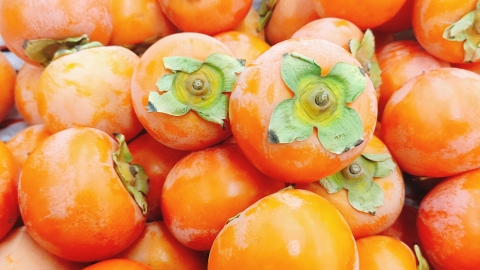What are the risks of drinking water infused with persimmon leaves?
Generally speaking, drinking water infused with persimmon leaves is not suitable for everyone. Improper consumption or consumption by certain groups of people may cause gastrointestinal discomfort, interfere with mineral absorption, trigger allergic reactions, increase the burden on the liver and kidneys, and lead to nervous system discomfort. The specific risks are analyzed as follows:

1. Gastrointestinal discomfort: Persimmon leaves contain significant amounts of tannic acid. When consumed directly as an infusion, the tannic acid may irritate the gastrointestinal mucosa, potentially causing symptoms such as nausea, vomiting, abdominal pain, and diarrhea. These effects are particularly pronounced when consumed on an empty stomach, as the gastrointestinal mucosa lacks the protection of food, intensifying the irritation and discomfort.
2. Interference with mineral absorption: Tannic acid not only irritates the gastrointestinal tract but also combines with minerals such as calcium, iron, and zinc from food, forming precipitates that are difficult for the body to absorb. Long-term consumption of persimmon leaf-infused water may hinder the absorption of these essential minerals, thereby affecting normal physiological functions.
3. Allergic reactions: Some individuals may be allergic to certain components in persimmon leaves. Consumption may lead to allergic symptoms such as skin itching, rashes, and hives. In severe cases, symptoms may include difficulty breathing and throat swelling, posing a threat to overall health.
4. Increased burden on the liver and kidneys: Persimmon leaves contain substances that must be metabolized by the liver and excreted by the kidneys. For individuals with pre-existing liver or kidney dysfunction, long-term or excessive consumption of persimmon leaf-infused water may increase metabolic and excretory stress on these organs, potentially worsening liver and kidney function.
5. Nervous system discomfort: Excessive consumption of persimmon leaf-infused water may affect the nervous system, causing symptoms such as dizziness, headache, fatigue, and lethargy in some individuals, which can impair daily work and study performance.
It is recommended to avoid using unpurified, freshly picked persimmon leaves for infusion. If consumption is desired, choose persimmon leaves that have undergone tannin removal treatments. Additionally, control the amount and frequency of consumption, and exercise caution among special populations such as the elderly, children, pregnant women, and individuals with chronic diseases.






